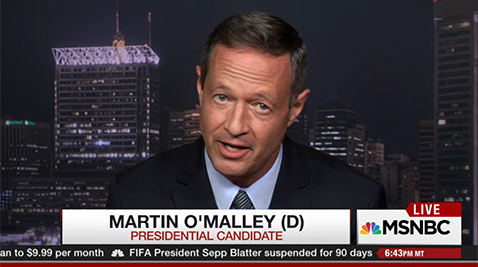Video by Mike Tart and Kathryn Klett
By SHARADHA KALYANAM and JON BANISTER
Capital News Service
WASHINGTON — Tuesday’s Democratic presidential debate is Martin O’Malley’s first shot at national exposure – and it also could be his last, experts say.
The debate, hosted by CNN in Las Vegas, Nev., is the first of six planned by the Democratic Party.
O’Malley, Maryland’s former governor, received support from just 2 percent of the voters in his home state in a poll released earlier this week by Goucher College. Fellow candidate and frontrunner Hillary Clinton received 43 percent and Vermont Sen. Bernie Sanders got 17 percent.
More important for O’Malley’s immediate political future, he has done no better in national polls and surveys in the early caucus and primary states of Iowa and New Hampshire.
Although the debate essentially is going to be O’Malley’s introduction to the nation’s voters, he is sharing the stage with two other Democrats, Clinton and Sanders, who have dominated media coverage so far.
Even so, O’Malley said in an MSNBC interview aired Thursday that he is looking forward to the debate.
“America is looking for a new leader and the Democratic Party has a responsibility to answer these Republican debates and put forward the new ideas that’ll actually move our country forward. And that’s what I intend to do in this upcoming debate,” he said.
Tuesday is an important moment for O’Malley, said Kyle Kondik, managing editor of Sabato’s Crystal Ball at the University of Virginia Center for Politics in Charlottesville, Va.
“O’Malley finds himself with little support from either insiders or outsiders in the party, which is an unenviable position,” Kondik said.
He added that O’Malley has been largely ignored by the Democratic leadership, which has supported Clinton instead, “while the more liberal, anti-Clinton forces in the party have coalesced around Bernie Sanders.”
His closing days in Annapolis set the stage for O’Malley’s troubles, said Stella Rouse, director of the Center for American Politics and Citizenship at the University of Maryland in College Park.
“He became a very unpopular governor, so he had no way to leverage his popularity in the state into a national platform because he was already underwater when he left office,” Rouse said. “The state went in a different direction (and) his heir (Lt. Gov. Anthony G. Brown) got beaten.”
O’Malley also has had difficulty differentiating himself from the top two candidates in the race, Rouse said, and he will need to find ways to contrast himself during the debate in order to make an impression on viewers.
According to Kondik, O’Malley could win over voters who may not like Clinton, but also are uncomfortable with someone as far-left as Sanders.
On the other hand, if Vice President Joe Biden enters the fray “that will make O’Malley even more of a national afterthought,” Kondik said.
O’Malley’s campaign is hosting 35 debate watch parties throughout Iowa, where he has spent much of his resources in hopes of gaining momentum in the first-in-the-nation caucus state. A recent NBC News/Wall Street Journal poll had O’Malley at 4 percent among declared candidates.
“A lot of time O’Malley does stuff and the air is taken out of his bubble quickly,” Rouse pointed out. “I think he’s gonna have a harder time on this stage differentiating himself because he doesn’t have any momentum going into this election.”
Even if O’Malley’s performance in the debate does not translate into any movement in the polls, he still might stand a chance to gain traction in Iowa, according to Kondik.
“Decamping to Iowa for the next several months and trying to be the Democratic equivalent of Rick Santorum, the Republican who came on late to win the Iowa caucuses in 2012 despite being ignored for much of the pre-caucus season” would be O’Malley’s way forward, Kondik said.
Political observers think that even if O’Malley’s chances remain slim this time around, the 52-year-old former chief executive may continue his campaign to raise his national profile in hopes of landing a cabinet position or running again in the future.
“If you look at the landscape when he ran, he didn’t have a whole lot to lose,” Rouse said. “Where he does have opportunity to gain is to get his name out there and get national recognition and notoriety.”
“That can only help his visibility for any kind of future aspirations that he has,” she said.
O’Malley supporter Steve Yelich, who runs the “Ready for Martin O’Malley” Facebook and Twitter pages but has no affiliation with the campaign, said he is looking forward to the governor being able to introduce himself to the country. Yelich said he hopes CNN gives O’Malley a fair amount of time to speak during the debate.
“If he’s given the opportunity he’s gonna be able to shine,” Yelich said. “I’m not saying this debate is do-or-die, but if he screws it up it’s gonna be a bad thing. He needs to do at least fairly well. If he knocks it out of the park, that’s gonna be great.”

